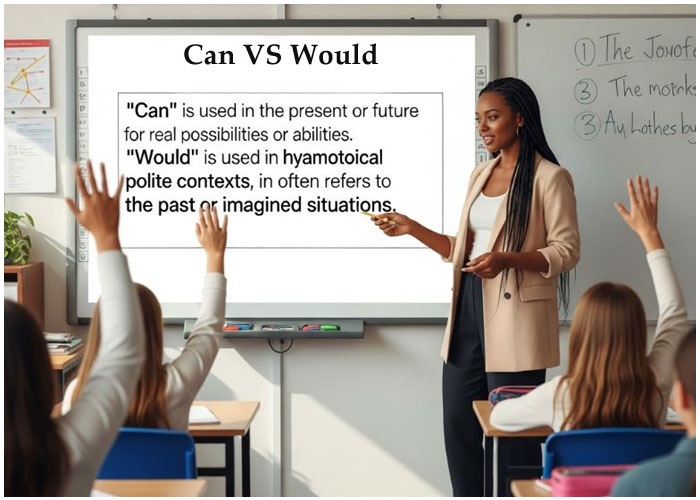Are you confused about when to use “would” vs. “can”? You’re not alone. Many English learners—even advanced ones—struggle to choose between these two commonly used modal verbs. Although “would” and “can” may seem similar at first glance, they have distinct meanings, structures, and tones that can completely change the message you’re trying to convey.
In this comprehensive guide, we’ll explore the difference between would and can, explain their grammar structures, show you real-life usage examples, and provide a handy comparison chart. Whether you’re asking a question, making a polite request, or expressing possibility or ability, understanding the uses of would and can will dramatically improve your English fluency.
Understanding Modal Verbs
In English grammar, modal verbs are helping verbs that express necessity, ability, permission, possibility, or intention. They modify the meaning of the main verb and help form questions or polite requests.
Some common modal verbs include: can, could, may, might, shall, should, will, would, and must.
Why “Would” and “Can” Are Often Confused
Both “would” and “can” express ability, possibility, or requests, but they’re used in very different contexts:
- “Can” is used in the present or future for real possibilities or abilities.
- “Would” is used in hypothetical or polite contexts, and often refers to the past or imagined situations.
Because they sometimes appear interchangeable, learners often misuse them, especially in questions or conditional sentences.
Quick Modal Examples:
- Can: “She can drive a car.” (She has the ability.)
- Would: “She would drive if she had a car.” (A hypothetical situation.)
The Key Difference Between Would and Can
Let’s break it down:
| Verb | Usage | Example |
|---|---|---|
| Can | Expresses ability, permission, or possibility in the present/future. | “Can you help me move tomorrow?” |
| Would | Used for politeness, hypotheticals, or past habits. | “Would you help me if I asked nicely?” |
Example Comparison:
Can you help me? (Direct, informal)
- Would you help me? (Polite, more formal)
The difference between would and can lies not just in English grammar, but in tone and context. “Can” often sounds straightforward, while “would” adds softness or conditional meaning.
Structure of Would and Can
Understanding the grammar structure is essential for using these modal verbs correctly.
Sentence Structures:
- [Subject] + can + base verb
- She can cook.
- They can come early.
- [Subject] + would + base verb
- She would cook if she had time.
- He would help, but he’s busy.
Negative Forms:
- Can → cannot / can’t
- He can’t swim.
- Would → would not / wouldn’t
- I wouldn’t do that.
Questions:
- Can you drive?
- Would you like some coffee?
Uses of “Can” with Examples
Here’s how “can” is used in everyday English:
Ability
- “She can speak three languages.”
- “Can you lift this box?”
Permission
- “Can I use your pen?”
- “You can leave early today.”
Possibility
- “It can get very hot in summer.”
- “Mistakes can happen.”
These uses are typically related to current situations or real possibilities.
Uses of “Would” with Examples
“Would” expresses more subtle or complex meanings. Here are its main uses:
Polite Requests
- “Would you like tea or coffee?”
- “Would you mind opening the window?”
Used in formal or respectful communication.
Hypotheticals / Conditionals
- “I would travel more if I had more money.”
- “He would help if he weren’t busy.”
This shows actions dependent on conditions—often things that aren’t real yet.
Past Habits
- “When we were kids, we would play in the rain.”
- “My grandmother would tell stories every night.”
Here, “would” replaces used to when describing past routines.
Mini Scenario: If Mark had time, he would join us. But since he’s working late, he can’t.
Would vs Can Comparison Chart
For quick reference, here’s a visual comparison of the two modal verbs:
| Feature | Can | Would |
|---|---|---|
| Tense | Present / Future | Past / Hypothetical |
| Usage | Ability, permission, possibility | Polite requests, conditionals, past habits |
| Tone | Direct, informal | Polite, formal, or conditional |
| Examples | “Can I help you?” | “Would you like some help?” |
Common Mistakes When Using “Would” and “Can”
Understanding the difference is only half the battle. Avoid these common learner errors:
❌ Using “can” in place of “would” for polite offers:
- Wrong: “Can you like some tea?”
Correct: “Would you like some tea?”
❌ Mixing up tense context:
- Wrong: “He can go if he had time.”
- Correct: “He would go if he had time.”
❌ Confusing past ability with “would”:
- Use “could” for past ability: “I could run faster when I was younger.”
Quick Tip: When in doubt, use “would” for imagined, polite, or past situations—and “can” for current reality or clear permission.
Read also more related topics: Could VS Would
Practice Sentences and Quick Quiz
Fill-in-the-Blank (Choose “can” or “would”):
- She ___ help you with your homework.
- ___ you like to come to the party?
- I ___ swim when I was five.
- ___ you open the door, please?
- If I had more time, I ___ learn guitar.
Answer Key:
- can
- Would
- could
- Can
- would
Want more practice? Download our free “Would vs Can Worksheet” or take the quiz here.
Last Word
Mastering the use of “would” vs. “can” is crucial for sounding polite, professional, and clear in English conversations. While both are modal verbs, they differ in tense, tone, and intention. “Can” is perfect for real-time abilities or permissions, while “would” excels in expressing polite offers, past habits, and imagined scenarios.
Practice makes perfect—so start using what you’ve learned in real conversations today. Want to improve your grammar even more? Download our free grammar guide or subscribe for weekly English tips and lessons!

